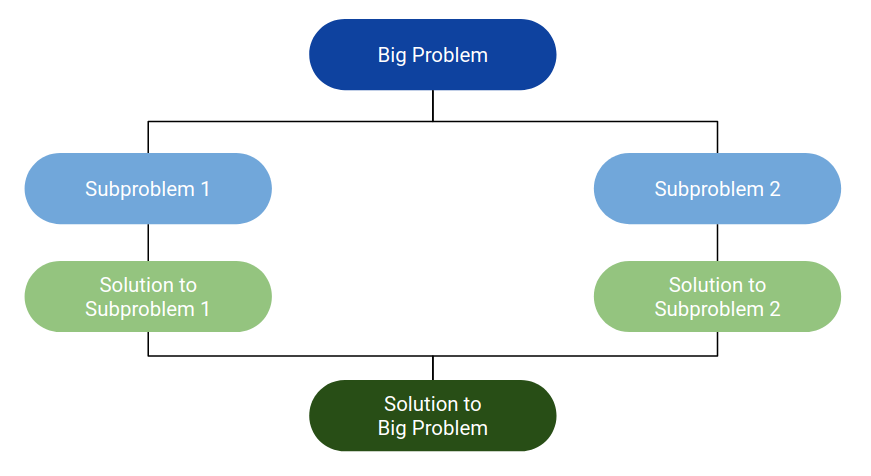# Divide and Conquer --- CS 137 // 2021-10-04 <!--=====================================================================--> ## Administrivia - You should have turned in: + Your solution for daily exercise 7 <!--=====================================================================--> # Questions ## ...about anything? <!--=====================================================================--> # Daily Exercise 7 <!--=====================================================================--> # Complexity of Sorting <!-- .slide: data-background="#004477" --> <!--=====================================================================--> ## Complexity of Sorting - The best sorting algorithms we've seen so far are $O(n \log n)$ - <!-- .element: class="fragment"--> Is it possible to do *better*? <!--=====================================================================--> ## Comparison Sorts - A *comparison* sort is a sorting algorithm that repeatedly compares two elements using some form of `<` operation - <!-- .element: class="fragment"--> **Claim:** Any comparison sort requires $\Omega(n \log n)$ comparisons <!----------------------------------> ## Comparison Sort Complexity - Note that we can represent a comparison sort algorithm as a **tree** + Leaves represent final, sorted, array - <!-- .element: class="fragment"--> How many leaves are there? + <!-- .element: class="fragment"--> At least $n!$ (otherwise two input permutations would terminate with the same leaf) - <!-- .element: class="fragment"--> **Lemma:** $n! \ge \left(\frac{n}{2}\right)^{\frac{n}{2}}$ <!----------------------------------> ## Proof of Claim - Comparison sorting tree has $n!$ leaves - <!-- .element: class="fragment"--> Assume that tree has height $k$ - <!-- .element: class="fragment"--> The shortest possible tree has $2^{k-1}$ leaves - <!-- .element: class="fragment"--> $2^{k-1} \ge n! \ge \left(\frac{n}{2}\right)^{\frac{n}{2}}$ - <!-- .element: class="fragment"--> $\log_2(2^{k-1}) \ge log_2 \left(\frac{n}{2}\right)^{\frac{n}{2}}$ - <!-- .element: class="fragment"--> $k-1 \ge \frac{n}{2} \log_2(\frac{n}{2})$ - <!-- .element: class="fragment"--> $k = \Omega(n\log n)$ <!--=====================================================================--> ## Non-Comparison Sorts - Only way to do better than $\Theta(n\log n)$ is to avoid comparing elements - <!-- .element: class="fragment"--> How is this possible? - <!-- .element: class="fragment"--> Suppose that I am sorting an array of 0s and 1s + Can we sort this faster than $O(n \log n)$? <!--=====================================================================--> ## Radix Sort - **Key idea:** Sort elements by digits + Group them all by their most significant digit + <!-- .element: class="fragment"--> Then by their next significant digit + <!-- .element: class="fragment"--> Until they are sorted - <!-- .element: class="fragment"--> Works on strings, too - <!-- .element: class="fragment"--> Runtime is $O(nw)$ where $w$ is the "length" of the elements + <!-- .element: class="fragment"--> Numerical data bounded by 64 bits makes the algorithm $O(n)$ time <!--=====================================================================--> # Divide and Conquer <!-- .slide: data-background="#004477" --> <!--=====================================================================--> ## Divide and Conquer  <!--=====================================================================--> ## Fast Heap Construction - Recall that we wrote an algorithm to construct a heap in $O(n\log n)$ time ```java Heap<E> make_heap(E[] elements) { Heap<E> heap = new Heap<E>(); for (int i = 0; i < elements.length; i++) { heap_insert(heap, elements[i]); } return heap; } ``` - <!-- .element: class="fragment"--> Can we do better? <!----------------------------------> ## Fast Heap Construction - **Key idea:** Divide the elements in half and create two heaps of size $\frac{n}{2}$ and combine them - <!-- .element: class="fragment"--> If we make both heaps children of a root node, it takes $O(\log n)$ time to bubble down the root - <!-- .element: class="fragment"--> Runtime can be expressed as a **recurrence relation** + $T(n) = 2T(\frac{n}{2}) + O(\log n)$ <!--=====================================================================--> # Recurrence Relations <!-- .slide: data-background="#004477" --> <!--=====================================================================--> ## Recurrence Relations - All divide and conquer algorithms have runtimes that are easiest to express with a recurrence relation + $T(n) = a\cdot T(\frac{n}{b}) + f(n)$ - <!-- .element: class="fragment"--> **Binary Search:** + <!-- .element: class="fragment"--> $T(n) = T(\frac{n}{2}) + O(1)$ - <!-- .element: class="fragment"--> **Merge Sort:** + <!-- .element: class="fragment"--> $T(n) = 2T(\frac{n}{2}) + O(n)$ <!--=====================================================================--> ## Exercise 1 - Given two sorted arrays $A$ and $B$ of size $n$ and $m$ respectively, find the median of the elements. - <!-- .element: class="fragment"--> *Hint:* You can do better than $O(n)$-time! <!--=====================================================================--> ## Exercise 2 - Given an unsorted array $A$ of $n$ elements, find the $k$th smallest element of $A$ - <!-- .element: class="fragment"--> *Hint:* You can do better than $O(n\log n)$-time!